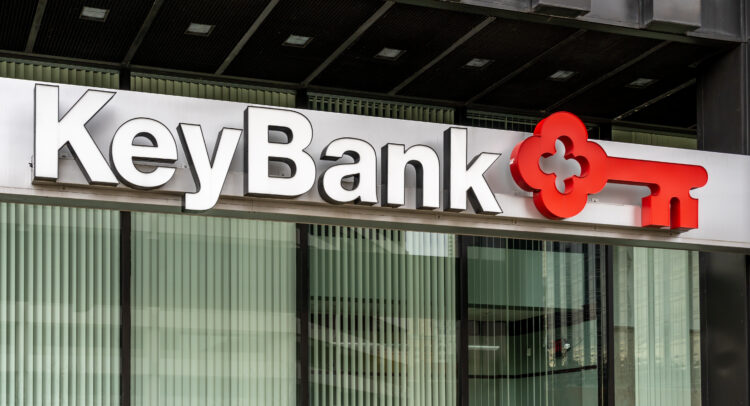At first glance, a steep double-digit drop in regional banking giant KeyCorp (NYSE:KEY) to start the week might seem like an opportunity to acquire KEY stock on the cheap. However, investors need to be extremely careful with this and other financial enterprises. Essentially, the present paradigm no longer favors long-side market participants. I am bearish on the banking enterprise.
Invest with Confidence:
- Follow TipRanks' Top Wall Street Analysts and uncover their success rate and average return.
- Join thousands of data-driven investors – Build your Smart Portfolio for personalized insights.

As TipRanks contributor Yulia Vaiman explained, the collapse of SVB Financial (NASDAQ:SIVB) — Silicon Valley Bank — sent shockwaves throughout the financial system. In particular, it imposed a body blow on the U.S. regional banking stock index, leading it to its worst week since 2020. Unsurprisingly, many investors fretted that the contagion could spread to other financial institutions with large bond portfolios.
At writing, the U.S. 10-Year Treasury yield stands at 3.64%. Unfortunately, Silicon Valley expanded its 10-year bond portfolio dramatically when yields sat at significant lows. When rates rose quickly in 2022, Silicon Valley essentially held substantial unrealized losses (since anyone could go to the open market and buy bonds with much higher yields).
Combined with a run on the bank as consumers panicked, the financial institution could no longer meet all withdrawal requests.
To be sure, KeyCorp represents a different enterprise. Nevertheless, KEY stock stumbled over 27% yesterday (although it has bounced back a bit today). Therefore, it would be imprudent not to recognize the risks. Below are three reasons to exercise extreme caution.
All Alone with KEY Stock
Setting a strong message to promote stability and confidence, a joint statement by the Treasury, the Federal Reserve, and the Federal Deposit Insurance Corporation clarified that the U.S. government will move to protect households and businesses blindsided by the banking failures. Moving forward, though, any future failures will likely not protect shareholders. Therefore, you’d be all alone and naked with KEY stock.
Indeed, the joint statement declared bluntly, “Shareholders and certain unsecured debtholders will not be protected. Senior management has also been removed.” In other words, the Biden administration will protect the innocent. It will not cover the losses of perpetrators and speculators.
Morally, one could make the argument that this approach may be the most sensible. However, it also sends a chill to anyone even thinking about acquiring banking shares. Therefore, it’s probably best to avoid KEY stock for now.
Withdrawals Equate to Deflation
Without getting bogged down with the granularity of the aforementioned bank failures, it’s important to understand the basic concept of a bank run. Fundamentally, when customers pull money out of the bank, financial institutions have fewer units of currency to distribute. Assuming that this withdrawn money goes straight into a personal vault, the economy suffers from monetary deflation: less money chasing goods.
For KEY stock and its ilk, this circumstance presents an especially problematic circumstance because of the velocity of M2 money stock. Though it accelerated throughout 2022, money velocity – or the rate at which each unit of currency circulates throughout the economy – remains near historical lows. Therefore, future bank runs will likely only exacerbate currently existing deflationary forces.
Of course, if left unchecked, these forces will likely spark job losses, unwinding the gains of the labor market. While that’s been the Fed’s goal since inflation struck, achieving this objective will hurt. Almost certainly, the circumstances will not be pleasant for KEY stock.
KEY’s Financials Shake Confidence
At first glance, some of the core financials undergirding KEY stock appear attractive. For one thing, KeyCorp’s return on equity stands at nearly 13%, outpacing almost 67% of banking peers. Additionally, the market prices KEY at a trailing multiple of 5.9. This ranks better (lower) than 61.59% of the competition.
However, drilling into the details, some concerns rise to the forefront. For instance, KeyCorp has been building its asset base at 6.3% a year, which ranks faster than its revenue growth rate of 2.3% over the past five years. Therefore, KeyCorp signals that it may be shedding efficiency.
More critically, KeyCorp suffers from poor financial stability. Currently, its cash-to-debt ratio sits at 0.04 times, ranking worse than 97% of sector peers. Amid worrying economic developments, that’s not a great sign for KEY stock.
Is KEY Stock a Buy, According to Analysts?
Turning to Wall Street, KEY stock has a Moderate Buy consensus rating based on five Buys, seven Holds, and one Sell rating. The average KEY stock price target is $19.63, implying 51.3% upside potential.

The Takeaway: KEY Stock Presents Hefty Risks for Limited Rewards
Although it’s sometimes beneficial to aggressively acquire stocks at discounts, KEY stock should probably be avoided. With KeyCorp suffering from questionable financial metrics and wider banking industry fears, investors might not see positive returns. Plus, if KEY fails, the government already signaled that it won’t help investors. For many, that’s going to be a no-go.









